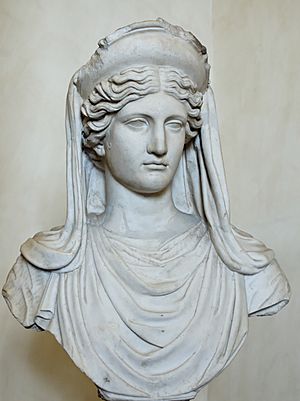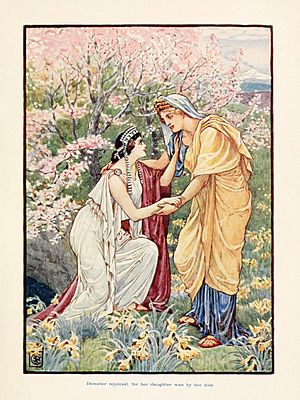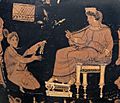Demeter facts for kids
Quick facts for kids Demeter |
|
|---|---|
| Goddess of agriculture, harvest, fertility and sacred law. | |
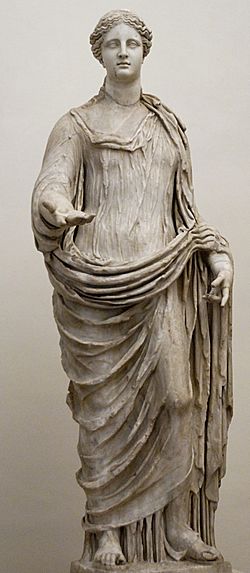
A marble statue of Demeter, National Roman Museum
|
|
| Other names | Sito, Thesmophoros |
| Abode | Mount Olympus |
| Symbol | Cornucopia, wheat, torch, bread |
| Festivals | Thesmophoria, Eleusinian Mysteries |
| Personal information | |
| Consort | Iasion, Zeus, Carmanor, Poseidon |
| Children | Persephone, Despoina, Arion, Plutus, Philomelus, Eubuleus, Chrysothemis |
| Parents | Cronus and Rhea |
| Siblings | Hestia, Hera, Hades, Poseidon, Zeus, Chiron |
| Roman equivalent | Ceres |
Demeter (Attic Greek: Δημήτηρ, Dēmḗtēr; Doric: Δαμάτηρ, Dāmā́tēr) is the goddess of the harvest and agriculture in ancient Greek religion and myth, one of the Twelve Olympians.
The elder sister of Zeus, Demeter presided over grains and the fertility of the earth. She served as the patron goddess of farmers, and was believed to have taught men how to reap and cultivate the harvest. By Zeus, she is the mother of Persephone, the wife of Hades and queen of the underworld. Both she and Persephone were central figures of the Eleusinian Mysteries, a series of festivals held in honor of the two goddesses in the region of Attica. Her symbols were the scythe, cornucopia, wheat, bread and harvest grains, and the pig and snake were her sacred animals. Her Roman equivalent is Ceres.
In Greek Mythology, Demeter's daughter Persephone was kidnapped by Hades, and made her bride. Demeter grieved the loss of her daughter, bringing on a long famine. Eventually an accord was met by which Persephone would spend part of the year underground, and the rest above ground with her mother. This cycle is the Mythological explanation for the seasons.
Demeter gave Triptolemus her serpent-drawn chariot and seed and bade him scatter it across the earth (teach humankind the knowledge of agriculture). Triptolemus rode through Europe and Asia until he came to the land of Lyncus, a Scythian king. Lyncus pretended to offer what's accustomed of hospitality to him, but once Triptolemus fell asleep, he attacked him with a dagger, wanting to take credit for his work. Demeter then saved Triptolemus by turning Lyncus into a lynx and ordered Triptolemus to return home airborne.
When her son Philomelus invented the plough and used it to cultivate the fields, Demeter was so impressed by his good work that she immortalized him in the sky by turning him into a constellation, the Boötes.
Hierax, a man of justice and distinction, set up sanctuaries for Demeter and received plenteous harvests from her in return. When the tribe neglected Poseidon favour of Demeter, the sea god destroyed all of her crops, so Hierax sent them instead his own food and was transformed into a hawk by Poseidon.
Besides giving gifts to those who were welcoming to her, Demeter was also a goddess who nursed the young; all of Plemaeus's children born by his first wife died in a cradle; Demeter took pity on him and reared herself his son Orthopolis. Plemaeus built a temple to her to thank her. Demeter also raised Trophonius, the prophetic son of either Apollo or Erginus.
Contents
Festivals
Demeter's two major festivals were sacred mysteries. Her Thesmophoria festival (11–13 October) was women-only. Her Eleusinian mysteries were open to initiates of any gender or social class. At the heart of both festivals were myths concerning Demeter as Mother and Persephone as her daughter.
Myths
Abduction of Persephone
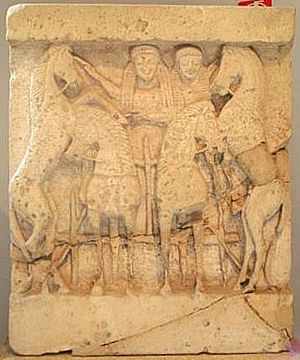
Demeter's daughter Persephone was abducted to the Underworld by Hades, who received permission from her father Zeus to take her as his bride. Demeter searched for her ceaselessly for nine days, preoccupied with her grief. Hecate then approached her and said that while she had not seen what happened to Persephone, she heard her screams. Together the two goddesses went to Helios, the sun god, who witnessed everything that happened on earth thanks to his lofty position. Helios then revealed to Demeter that Hades had snatched a screaming Persephone to make her his wife with the permission of Zeus, the girl's father. Demeter then filled with anger. The seasons halted; living things ceased their growth and began to die. Faced with the extinction of all life on earth, Zeus sent his messenger Hermes to the Underworld to bring Persephone back. Hades agreed to release her if she had eaten nothing while in his realm, but Persephone had eaten a small number of pomegranate seeds. This bound her to Hades and the Underworld for certain months of every year, most likely the dry Mediterranean summer, when plant life is threatened by drought, despite the popular belief that it is autumn or winter. There are several variations on the basic myth
Demeter at Eleusis
Demeter's search for her daughter Persephone took her to the palace of Celeus, the King of Eleusis in Attica. She assumed the form of an old woman and asked him for shelter. He took her in, to nurse Demophon and Triptolemus, his sons by Metanira. To reward his kindness, she taught Triptolemus the secrets of agriculture, and he, in turn, taught them to any who wished to learn them. Thus, humanity learned how to plant, grow and harvest grain. The myth has several versions.
Demeter and Erysichthon
Another myth involving Demeter's rage resulting in famine is that of Erysichthon, king of Thessaly. The myth tells of Erysichthon ordering all of the trees in one of Demeter's sacred groves to be cut down, as he wanted to build an extension of his palace and hold feasts there. One tree, a huge oak, was covered with votive wreaths, symbols of the prayers Demeter had granted, so Erysichthon's men refused to cut it down. The king used an axe to cut it down, killing a dryad nymph in the process. The nymph's dying words were a curse on Erysichthon. Demeter punished the king by calling upon Limos, the spirit of unrelenting and insatiable hunger, to enter his stomach. The more the king ate, the hungrier he became. Erysichthon sold all his possessions to buy food but was still hungry. Finally, he sold his daughter, Mestra, into slavery. Eventually, Erysichthon ate himself.
Related pages
Images for kids
-
Demeter on a Didrachme from Paros island, struck at the Cyclades.
-
Demeter, enthroned and extending her hand in a benediction toward the kneeling Metaneira, who offers the triune wheat (c. 340 BC)
-
Demeter in an ancient Greek fresco from Panticapaeum in the Bosporan Kingdom (a client state of the Roman Empire), 1st century Crimea.
-
Triptolemus, Demeter and Persephone by the Triptolemos-painter, c. 470 BC, Louvre
-
Pompeiian relief of Demeter in her aspects of mother goddess and goddess of agriculture
See also
 In Spanish: Deméter para niños
In Spanish: Deméter para niños


